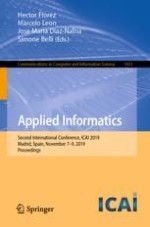2019 | OriginalPaper | Buchkapitel
Continuous Variable Binning Algorithm to Maximize Information Value Using Genetic Algorithm
verfasst von : Nattawut Vejkanchana, Pramote Kuacharoen
Erschienen in: Applied Informatics
Aktivieren Sie unsere intelligente Suche, um passende Fachinhalte oder Patente zu finden.
Wählen Sie Textabschnitte aus um mit Künstlicher Intelligenz passenden Patente zu finden. powered by
Markieren Sie Textabschnitte, um KI-gestützt weitere passende Inhalte zu finden. powered by
